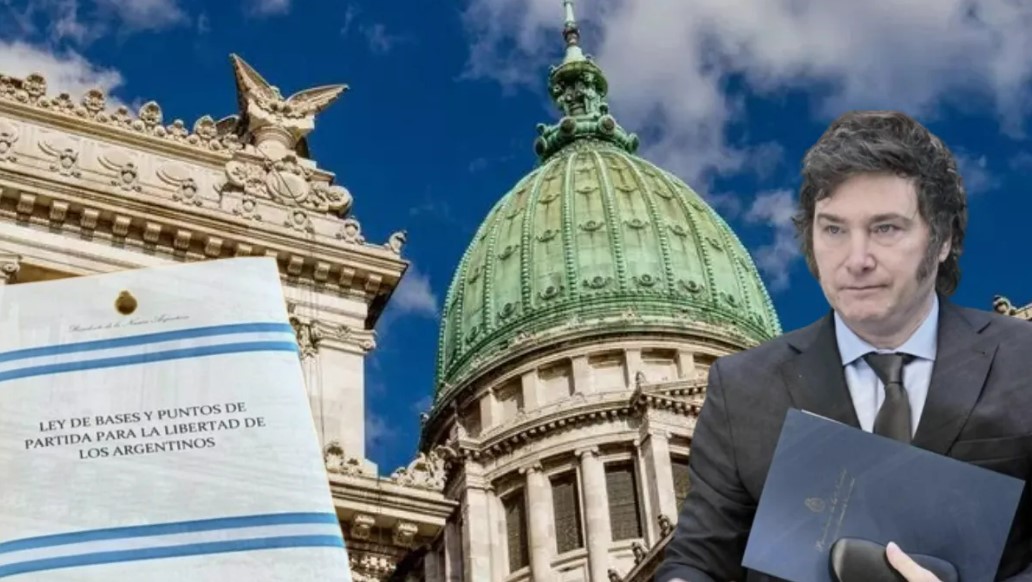
Each one did their own thing. Lucila Crexell a missing vote, in exchange for a position at UNESCO. Martín Lousteau, the decisive quorum that the ruling party needed to meet. The collaborationist blocs of the PRO, the UCR and some provincials, their usual votes. The Peronist senators Edgardo Kueider and Carlos Mauricio Espínola, elected by Unión por la Patria, two indispensable votes. The senators of Santa Cruz Carambia and Gadano their absence to facilitate voting on some of the points in particular. Guillermo Andrada, Carolina Moisés and Sandra Mendoza, three votes from Unión por la Patria for the RIGI. The leaders of the CGT and the CTA erased them from the streets, some from the beginning, others from the middle of the day, when there were still many hours before the vote, weakening the fight against the laws and against the repression of Patricia Bullrich .
In this way, Javier Milei was able, after six months, to have his first two laws approved, the Bases and the Fiscal Package. To know the final articles of it, the rules still need to return to the Deputies, where the changes introduced by the Senate will be approved or rejected.
The aforementioned actors are the ones who enabled this difficult step by the government, which since the summer had been trying to advance in the National Congress with its first laws. For working people it must be clear: They are responsible for approving the labor reform, the attack on public employment, the delegation of superpowers to the far-right Javier Milei to concentrate even more power or the delivery and looting mechanisms for the great economic power with the RIGI, among other points. Without ambiguity: those who voted for this are enemies of the people.
For months now, the demand for greater volume and political strength from the government of Javier Milei has been an increasingly loud cry from big capital. “The largest adjustment in history,” in the words of the president, was celebrated but doubts about its viability were growing. The IMF headed the list of those calling for progress in this regard.
In this context, the laws approved on Wednesday night and early Thursday morning will be celebrated by big capital. However, the triumphalism that the government will want to offer, and without ignoring the norms that were voted in favor of the big capitalists and against the working people, must be nuanced. Perhaps there is more to what the government avoided – a very acute crisis if the laws fell – than the strength it has gained towards the future.
First of all, the vote was agonizing. The empowerment of Minister Francos – after the fall of Posse – was that of a born negotiator who appealed to all the classic methods of the political caste, with concessions and perks included, to barely achieve an agonizing tie that unbalanced with his vote Victoria Villarruel. The Government has nothing left over and it is worth thinking about whether the bloc that obtained this vote can continue or was it just episodic. It may be a difficult formula to repeat.
Secondly, related to the above, these laws contain many reactionary points but the Government had to reduce it considerably in these weeks, not to mention the pharaonic project of the summer. In the last stretch, it went backwards with the elimination of the pension moratorium and with various privatizations such as those of Aerolíneas Argentinas and Correo.
Third, the Government suffered a major setback during the votes on the fiscal package, when it lost two key votes on Earnings and Personal Assets. It remains to be seen what attitude Deputies take when these modifications return to the Lower House. This is a decisive and conflictive issue for the Government’s fiscal plan.
Fourthly, the ruling party had reached this vote after its worst moments, and these problems cannot be swept under the rug, because in one way or another they left their mark and will remain. He had just suffered a defeat in the Deputies due to the increase in pensioners, from the fall-ejection of his Chief of Staff Nicolás Posse, from a monumental scandal in the Ministry of Human Capital of Sandra Pettovello, from a cabinet that has figures like Diana Mondino on a tightrope and in financial turbulence with parallel dollars, country risk and bonds, in the context of a very deep economic recession.
As a whole, the government thus begins its second half in a framework in which he will be forced to show results in the face of a social patience whose limits always act as an unknown. The reduction in inflation is the only “achievement” – apart from the laws, now – that the Government has to show, but that is not only in doubt – with tariffs and devaluation pressures – but it was also done at the cost of a monumental economic recession that threatens to bring unemployment to double digits and has plunged popular consumption. There are many doubts regarding a possible recovery scenario, with the “V” rebound ruled out by practically everyone. The low reserves of the Central Bank, in a context in which very heavy debt payments already appear on the horizon, cloud the horizon even more. That is why the discussion of the swap with China – whose immediate payment was finally cleared – was fraught with so much tension in recent days.
The new political situation will begin with poverty above 55% according to data from the UCA and with one million children who are eating one less meal per day, according to Unicef, while banks and energy companies continue to make super profits.
In the face of big capital, the Government has just obtained a break, but must still demonstrate that it has the political strength to manage its fiscal adjustment sustainability plan, apply labor reform and deliver natural common goods in such a delicate context. The approval of the laws probably does not mean that the government has become hegemonic or that it has sufficient political volume. The harsh social situation, the conflict and the laboriousness of the vote show how difficult what lies ahead is for Freedom Advances.
In this framework, the massive mobilization yesterday, despite the limits placed on it by the union bureaucracies of the CGT and the CTA that did not call for a national strike, and the union leaders who did go but withdrew in the middle of the day , acts as yet another warning that Milei’s plans will not pass without social resistance. Before, the popular uprising in Misiones had acted as a warning for power. The monumental repressive operation this Wednesday is not a show of political strength, but, on the contrary, a confession of the fear that the government has that the forces of the street will be unleashed. At the same time, it shows us our main challenge: to continue promoting organization and coordination, in the fight against union bureaucracy, to build a great social force to defeat Milei’s plan. In the immediate future, to mobilize, for example, if the Deputies want to restore the salary tax.
Not coincidentally, in recent weeks we also saw greater political intervention by the Church, as an actor of containment and articulation of political alternatives in the face of the crisis. From sectors of Peronism – this Thursday Axel Kicillof met with Pope Francis – they are also intensifying movements, but without ever betting on defeating Milei’s plan today, but only preparing to administer the remains of the country after the passage of the libertarian experiment, without ever question underlying problems such as submission to international financial capital, the agreement with the IMF or the dominance of big capital over the country’s strategic resources.
The left, on the other hand, was from the first day in the front row of the fight against this plan to reset the country in favor of the great economic power, and participates in each fight alongside neighborhood assemblies and in places of work and study. . These accumulated months of struggle and the great activity of agitation together with our deputies to expose and denounce the plan of political and economic power are also a support point to redouble the fight for the construction of a political solution that confronts liberalism in the government Do not look to the past looking for recipes that have already failed, but to establish a political alternative for the workers, socialist and revolutionary.
Source: www.laizquierdadiario.com

